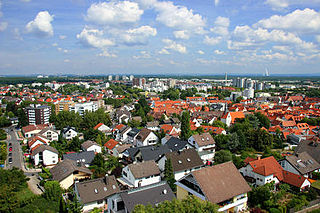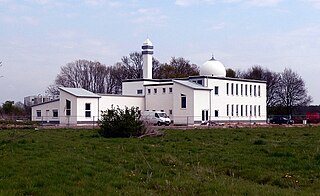
Duisburg is a city in the Ruhr metropolitan area of the western German state of North Rhine-Westphalia. Lying on the confluence of the Rhine and the Ruhr rivers in the center of the Rhine-Ruhr Region, Duisburg is the 5th largest city in North Rhine-Westphalia and the 15th-largest city in Germany.

Troisdorf is a city in the Rhein-Sieg-Kreis (district), in North Rhine-Westphalia, Germany.

Islam's significance in Germany has largely increased after the labour migration in the 1960s and several waves of political refugees since the 1970s.

Dietzenbach is the seat of Offenbach district in the Regierungsbezirk of Darmstadt in Hesse, Germany and lies roughly 12 km southeast of Frankfurt am Main on the waterstream Bieber. Before the Second World War, the current town was a farming village with not quite 4,000 inhabitants. However, after the war, there was a considerable upswing in the population due to refugees settling in the community. From the 1970s onwards, Dietzenbach's population rose rapidly, reaching some 33,000 by 2006. Just under a third of the inhabitants have roots in more than a hundred nations outside Germany. Agricultural buildings are nowadays seldom seen in Dietzenbach.

Berlin Mosque in Berlin is situated on Brienner Straße 7-8 in Berlin-Wilmersdorf. It was designed by K. A. Hermann and was built between 1923 and 1925. Berlin Mosque, which has two 27-metre-tall (90 ft) minarets, was heavily damaged in World War II. The two minarets were rebuilt in 1999/2001.

The Cologne Central Mosque is a building commissioned by German Muslims of the Organization DİTİB for a large, representative Zentralmoschee in Cologne, Germany. This mosque was inaugurated by Turkish President Erdogan. After controversy, the project won the approval of Cologne's city council.

Khadija Mosque is a mosque located in Heinersdorf, Pankow, Berlin, Germany. It is property of the Ahmadiyya Muslim Community, and the first mosque in former East Germany, opening on 16 October 2008. The mosque has a 12-metre-high (39 ft) minaret and has capacity for 500 worshippers. The mosque was financed by funds collected by Ahmadiyya women and the design was done by the architect Mubashra Ilyas.

The Mahmood Mosque, situated in Forchstrasse, Zurich, is the first purpose-built mosque in Switzerland. It is owned and run by the Ahmadiyya Muslim Community. The mosque has a minaret, the new construction of which is now banned in Switzerland by popular vote.

The Baitus Sami Mosque is located in the German city of Hanover. It has both a dome and minaret, although the minaret is too slender to be climbed. Built by an Ahmadiyya community, the mosque comprises approximately 2,800 square metres (30,000 sq ft), with space for 300 worshippers. Situated at a street in an industrial area outside a nearby residential area, it was inaugurated in August 2008 by the Caliph of the community, Mirza Masroor Ahmad. The construction of the mosque was opposed by many local people, with sometimes violent protests.

The Ahmadiyya are movement that comprise a minority of Germany, numbering some 35,000–45,000 adherents and found in 244 communities as of 2013.

The Pro Germany Citizens' Movement was a far-right political party in Germany. It was founded in Cologne on 20 January 2005 as apart of the Pro-movement after Pro Cologne members had been elected to the Cologne City Council. Manfred Rouhs, treasurer of the Pro Cologne movement and former candidate of the German League for People and Homeland and the National Democratic Party of Germany, was elected its first chairman. The federal party convent decided at its ninth ordinary meeting in Wuppertal on 11 November 2017 to dissolve the party.
The 100-Mosques-Plan is the project of the Ahmadiyya Muslim Jamaat in Germany to build 100 new mosques. It was initiated by Mirza Tahir Ahmad, the Khalifatul Masih IV, during the centenary celebrations of the community in 1989. The project is completely financed by the Ahmadiyya Muslim Community, Germany, through collections from the members. The plans and the execution of the projects is also mostly performed by German Ahmadis voluntarily. Ahmadiyya Muslim Community has total of 52 mosques and 65 prayer centres in Germany.

The Ibn Rushd-Goethe Mosque is the only self-described liberal mosque in Germany. It was inaugurated in June 2017, and is named after medieval Andalusian-Arabic polymath Ibn Rushd and German writer and statesman Johann Wolfgang von Goethe. The mosque was founded by Seyran Ateş, a German lawyer and Muslim feminist of Kurdish descent. The mosque is characterised as liberal; it bans face-covering, it allows women and men to pray together, and it accepts LGBT worshippers.

Serap Güler is a German politician of the Christian Democratic Union (CDU). She has been a Member of the German Bundestag since 2021, representing the Leverkusen – Cologne IV district.
In September 2018, Recep Tayyip Erdoğan visited Germany at the invitation of the German president Frank-Walter Steinmeier who had invited Erdogan after his re-election in 2018. Erdogan arrived on 27 September and departed on 29 September. With the invitation by Steinmeier, the visit became a state visit which included military honors and a state banquet.

The Schwetzingen Park Mosque, also known as the Red Mosque is a decorative building in the park of Schwetzingen Palace in the former Electoral Palatinate, now the northern tip of Baden-Württemberg, Germany. Built in 1779–1793 AD, it is the oldest mosque-like building in Germany.

The Hamburg Central Mosque is a mosque founded in 1977 by Association of Mosques and located in the Hamburg-St. Georg in Hamburg. «Islamic community of Hamburg — Centrum-Moschee e.V.» is a founding member of Alliance of Islamic Communities in Northern Germany (BIG) and member of Schura Hamburg, with which the State of Hamburg maintains State Treaty. On February 27, 2016, the Muslim theologian Mehmet Karaoglu was elected imam as chairman of the Central Mosque. He is also President of IGMG -Hamburg and Chairman of BIG. Fatih Yildiz was elected as a deputy. Karaoglu and Yildiz replaced the previous chairman and imam Ramazan Ucar and his deputy Ahmet Yazici after almost two decades.

The Day of the Open Mosque in Germany is an annually scheduled event day that has existed since 1997 and takes place on October 3, the Day of German Unity. On this day, the mosque communities offer the predominantly non-Muslim visitors mosque tours, panel discussions and book and art exhibitions. Folklore, tea, coffee and pastries are also often part of the social program.

The Selimiye-Mosque in Deggendorf is a DİTİB mosque opened in 2016 in Fischerdorf. The construction costed around 3.2 million Euros.




















